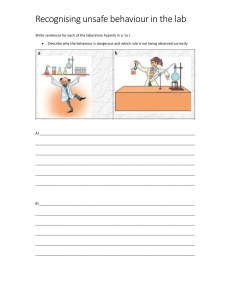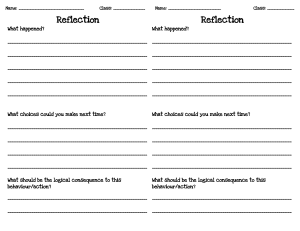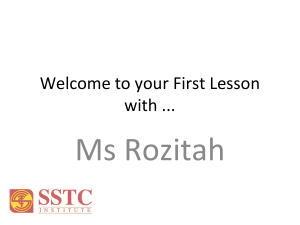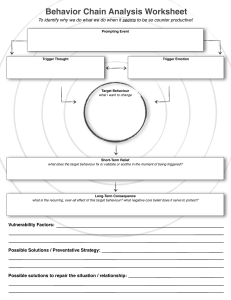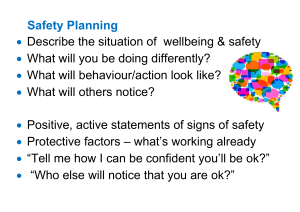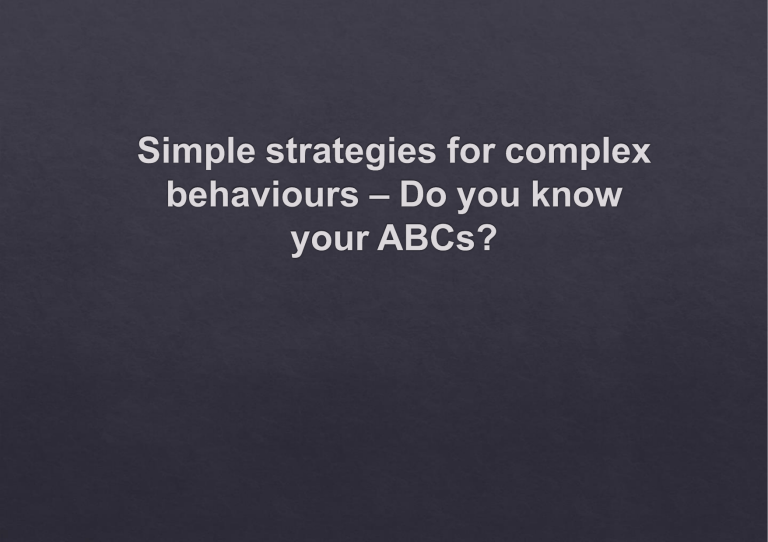
A way of characterising events and resultant behaviours: • A = Activating event • B = Behaviour • C = Consequence The ABC can be applied in all settings • A behaviour in response to an activating event generates a consequence • If the consequence is inappropriately managed, the situation may escalate & become another activating event Preventing & Managing Aggression A A Activating Event Behaviour will escalate if it's not well managed. Immediate management strategies: Remove other people from danger Remove potential weapons Give the person space (stand back) Communicate in a calm, non- confronting way - avoid asking 'What' or 'Why' - (remember communication is 55% body language, 38% tone of voice & only 7% words) Encourage the person to talk about how they are feeling Empathise, ie: I can see you are very angry, frightened etc…………. Allow the person time to talk through their issues & establish what the problem is (try to put yourself in their shoes) See specific strategies to manage aggression for ongoing management. •To prevent aggression, follow the behaviour, communication and all other personalised support plans. •If aggression occurs establish the activating event, or trigger. •There is always an A. B Behaviour C Consequence D •What happened as a result of A? Describe the actual behaviour, ie; verbal/physical aggression; weapon used (urinal, walking stick etc) •What was the consequence of B? •Assess why the person was aggressive - are they unwell, in pain? •Think about appropriate referrals De-escalate, Decide (& Debrief) •Allow time for recovery •What changes do you need to make - environmental, staffing. •How can you change A to better manage B? Brainstorm! • When & where did the behaviour occur? • What was the person doing immediately before the behaviour occurred? • What was happening around the person at the time? • Noise (eg. TV loud, music loud, staff change of shift, meal time clatter) • Clutter (eg. Furniture, people) • Bright lights/glare on the floor • Mirrors • Temperature (eg. Too hot/cold) • Recent changes to environment (eg. Renovations, staff/ resident changes) • Does the environment provide a safe area for residents to wander around? • Does the environment encourage independence, dignity and mobility? • Does the environment accept the client's cultural and lifestyle habits Metabolic Hyper/Hypo thyroidism, Hypercalcemia, Hyponatremia Infections Urinary tract infection, pneumonia, septicaemia Traumatic Chronic pain, head trauma, fractures such as hip & rib Systemic Hypoglycaemia, Vitamin B12 deficiency, folate deficiency Medications Sedatives, antihistamines, alcohol, polypharmacy Impaction Faecal Adapted from Banazak D. (1996) Difficult Dementia: Six steps to control problem behaviours. Geriatrics, Vol 51:2 Don’t forget Delirium • Has there been a recent change in medication? • Does the person have: – Impaired vision or hearing – Acute illness – Chronic illness (eg; angina, CCF, Diabetes) – Chronic pain (eg; arthritis, ulcers, headaches) – Dehydration – Fatigue or physical discomfort • History of psychiatric illness • Recent loss or accumulation of losses • Appear sad – tearful, withdrawn • Past events – Post traumatic stress, P.O.W. • Responding to hallucinations • IPA defines BPSD as “Symptoms of disturbed perception, thought content, mood or behaviour that frequently occur in patients with dementia”. Behavioural symptoms Psychological symptoms Physical aggression Anxiety Screaming Depressive mood Restlessness Paranoia Agitation Hallucinations Wandering Delusions Culturally inappropriate behaviours Sexual disinhibition Hoarding Constant questioning Cursing Shadowing • What was the consequence of the behaviour for the person, staff & others? – Ignored – Reprimanded – Restrained – Sedated • Very dependent on staff interpretation & reaction to the behaviour 7% 38% Body language Tone & pitch of voice 55% Words we use • What is the actual problem & whose problem is it? • What are the contributing factors • How can we increase our understanding of this? Brainstorm ideas to come up with an effective individual management plan • Where to from here? Is referral to a specialist service required? 81 year old Mrs Betty Baxter has recently been diagnosed with dementia and has moved to Shady Haven Nursing Home. She is well known around the town as a forthright (some might even say argumentative) lady, and the local CWA , and the regional Red Cross all breathed a sigh of relief when she resigned from the committee. Mrs (“I don’t like being called Betty”) Baxter has many medical problems and her medications were recently changed, with some doses having a higher dose with less tablets, due to her pharmacist recommending a cheaper brand. • Yesterday she refused her heart medication and became quite abusive and threw the glass of water, when the agency nurse tried to insist that she take the medication as prescribed. When the nurse politely but firmly reminded Betty, that this was not appropriate behaviour, Mrs Baxter slapped the nurse on the face. • Today her sister has come to visit and Betty will not allow her to come in to her room. Attempts by her sister to clarify the situation lead to verbal abuse and incoherent muttering. • For Betty ? • For the staff? • Behaviour that is misunderstood and managed inappropriately may escalate. • How would we apply the ABC framework? A = Activating Event (what was the trigger) B = Behaviour (what behaviour resulted) C = Consequence What was the consequence Mr Cyril Bogg is a retired security guard who has lived in an aged care facility for six months. Staff have become increasingly concerned that over the last few weeks, Cyril has been wandering in to peoples rooms at night. He is becoming increasingly intrusive & has frightened several elderly woman after they awoke to find him in their room. • Staff are concerned at his manipulative behaviour as he is not intrusive through the day, and are worried that he has ulterior motives. • Attempts to get Mr Bloggs to return to his room are unsuccessful & usually result in a verbal abuse. The GP has just commenced night sedation. • For Cyril? • For the staff? • Behaviour that is misunderstood and managed inappropriately may escalate. • How would we apply the ABC framework? A = Activating Event (what was the trigger) B = Behaviour (what behaviour resulted) C = Consequence What was the consequence
